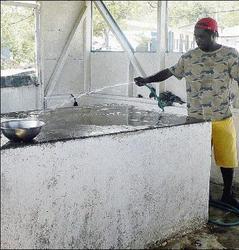Mark Titus, Enterprise Reporter

A vendor at the Boston Jerk Centre in Portland cleans his slaughterhouse after the morning's kill. - Photo by Mark Titus
In an effort to ensure that players in the meat industry maintain the required health standards, Government will be implementing a more rigid monitoring system.
Dr Osbil Watson, of the Veterinary Services Division in the Ministry of Agriculture, explains the Government's intention.
"First of all, what needs to be done is (to have) a centralised slaughter facility in each parish. That facility would see to the slaughter of animals in that area, with two or three (health) inspectors manning the process."
According to the veterinarian, the anticipation is that with the public slaughterhouses strategically located and offering First-World service, private abattoirs would be subject to more frequent inspections to ensure that the health and safety standards are maintained.
Referring to a number of state-of-the-art abattoirs being operated by private companies in Jamaica, Dr Watson says the Government intends to amplify those facilities "so that the people of Jamaica can get quality product".
Health threat
"If you continue to slaughter animals any and any way, you are threatening the health of your people. You will not be able to guarantee safe foods, the issue is food safety," Watson argued. "I think we have to start from scratch, and have some state-of-the-art facilities, bearing in mind that it would be to the benefit of the people. This is not difficult because the mechanism that is required to ensure that this happens is in place."
He also stressed the importance of the proper transportation of animals.
"All countries that are trading in animals and products of animal origins have to now put in place a system to safeguard animal welfare; animals must now be properly housed, if possible, air condition should be in place, but they must be adequately housed and transported under very humane conditions.
"A veterinary public health inspector or a veterinarian should be present to check the animal on arrival at the slaughter facility to ensure its origin and identity; in doing so, you also reduce the chances of praedial larceny."
Peter Knight, director of the Ministry of Health's Environmental Health Unit, also believes that establishing a centralised facility would address many of the issues.
"If we can establish one central slaughter place in each parish, and make it compulsory for every animal to be slaughtered there, then that would solve the problem.
"Any system that is not centralised will result in administrative issues because it is easier to manage 10 abattoirs than 1,000 slaughterhouses."
Lenworth Fulton, executive director of the Jamaica 4-H Clubs, endorses the idea, describing it as "a step in the right direction".
Step in the right direction
"Something needs to be done, we cannot continue like this, so it is a step in the right direction," he tells The Gleaner. "The laws are already in place. All it now needs is enforcement, and while we don't want to put our farmers under additional pressure, a standard is a standard."
However, Stephen Levy, general manager of Aquaculture Jamaica Limited, a fish-processing plant owned and operated by the Jamaica Broilers Group of Companies, warns that such a system might not be viable in the long run.
"I get discouraged when I hear about plans like this because it is not easy to get all those animals to one central location, it will not be easy to manage such an inventory," he tells The Gleaner. "Frankly, if somebody is not running it and it is not making money, it will not work.
"The majority of these abattoirs and slaughter facilities that you (The Gleaner) have visited have highly developed and skilled entrepreneurs operating them, and if you asked any of the ladies or gentlemen who manage those facilities if they want to be processing animals in those conditions, they will tell you, no way."
Levy continues, "But by the time they make the money, what is left can't even start to reinvest in the abattoirs.
maintain a high standard
"It takes a level of brainpower and know-how to process an animal safely," he notes, "You already have an entrepreneur, who has the knowledge and the skills to source his animals, to butcher them and to distribute them. All that he is in need of is for the Government to provide money (loans) at a good rate, some form of incentive to encourage him to maintain his place at a high standard."
Levy suggests that Government put incentives in place for operators of slaughter facilities and abattoirs to make their environment better.
"Give him money at good rates, a tax break or GCT break on every dollar that is borrowed to invest in his facility. Encourage him to maintain a high standard, and that is the only way to go if we are serious about establishing a high standard."
mark.titus@gleanerjm.com
TOMORROW: A look inside a first-class abattoir.

